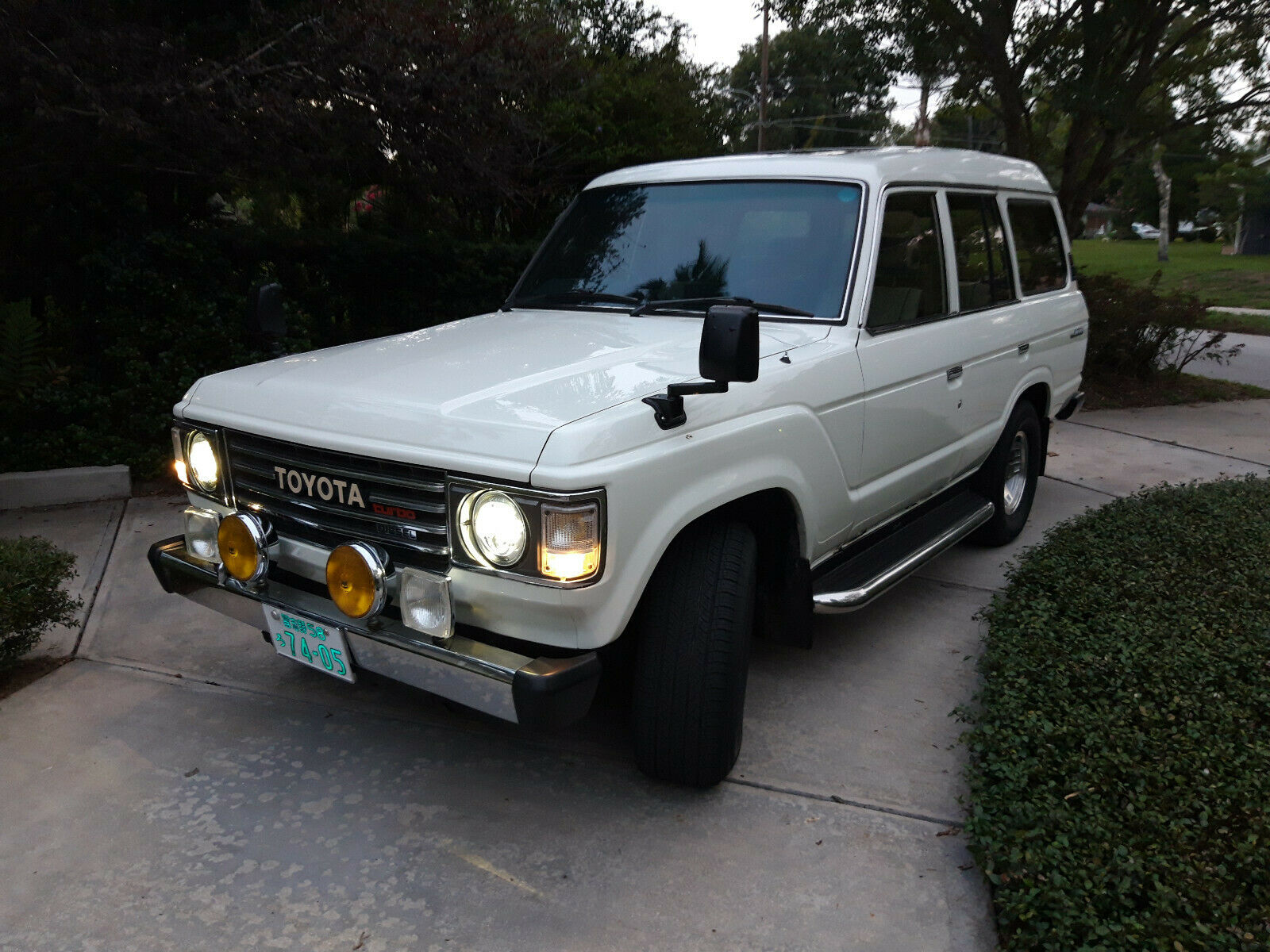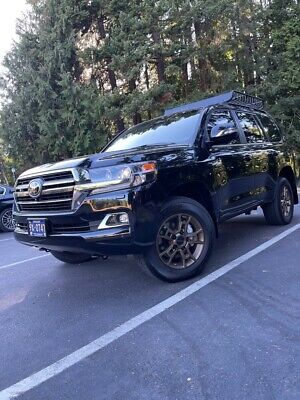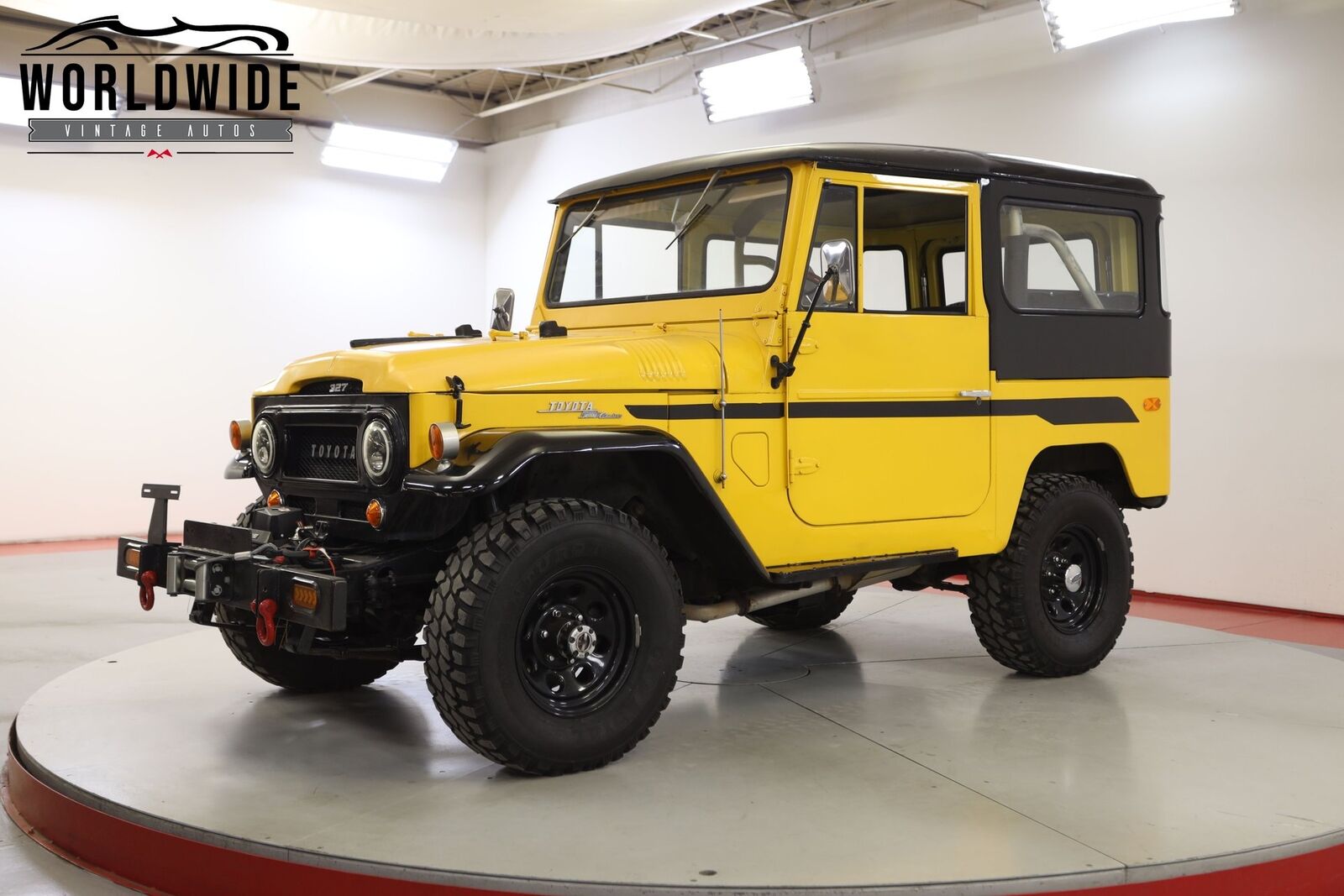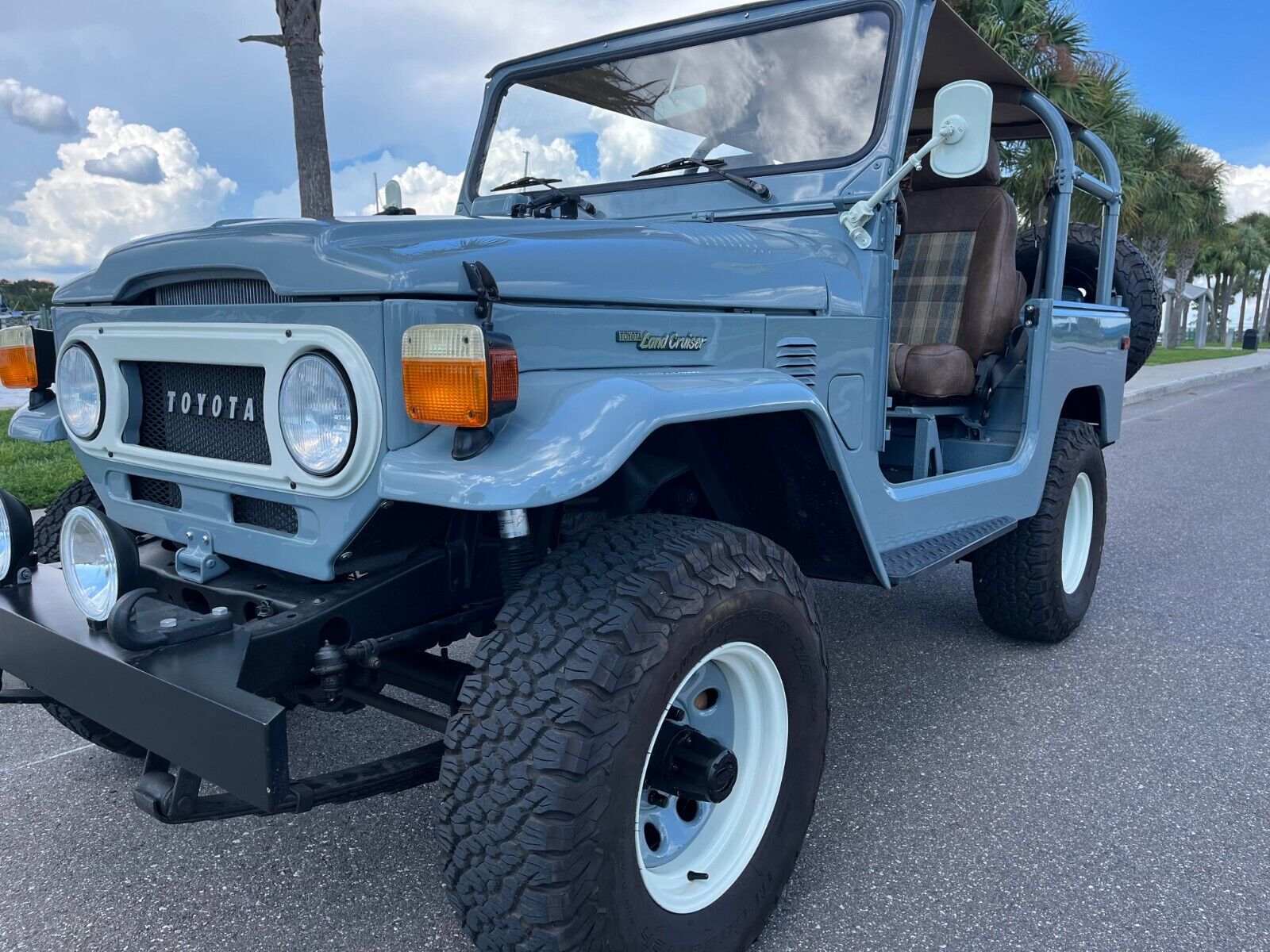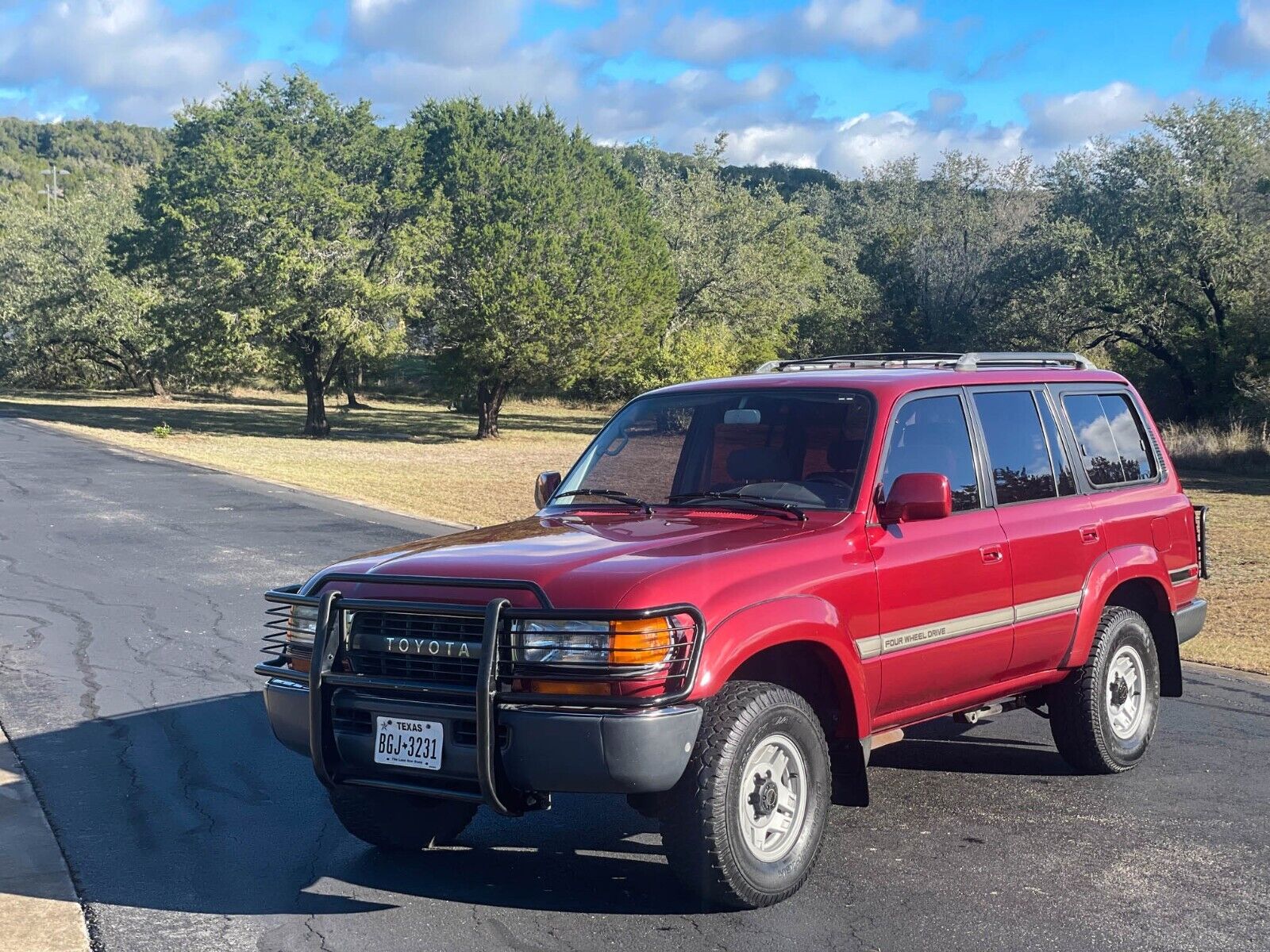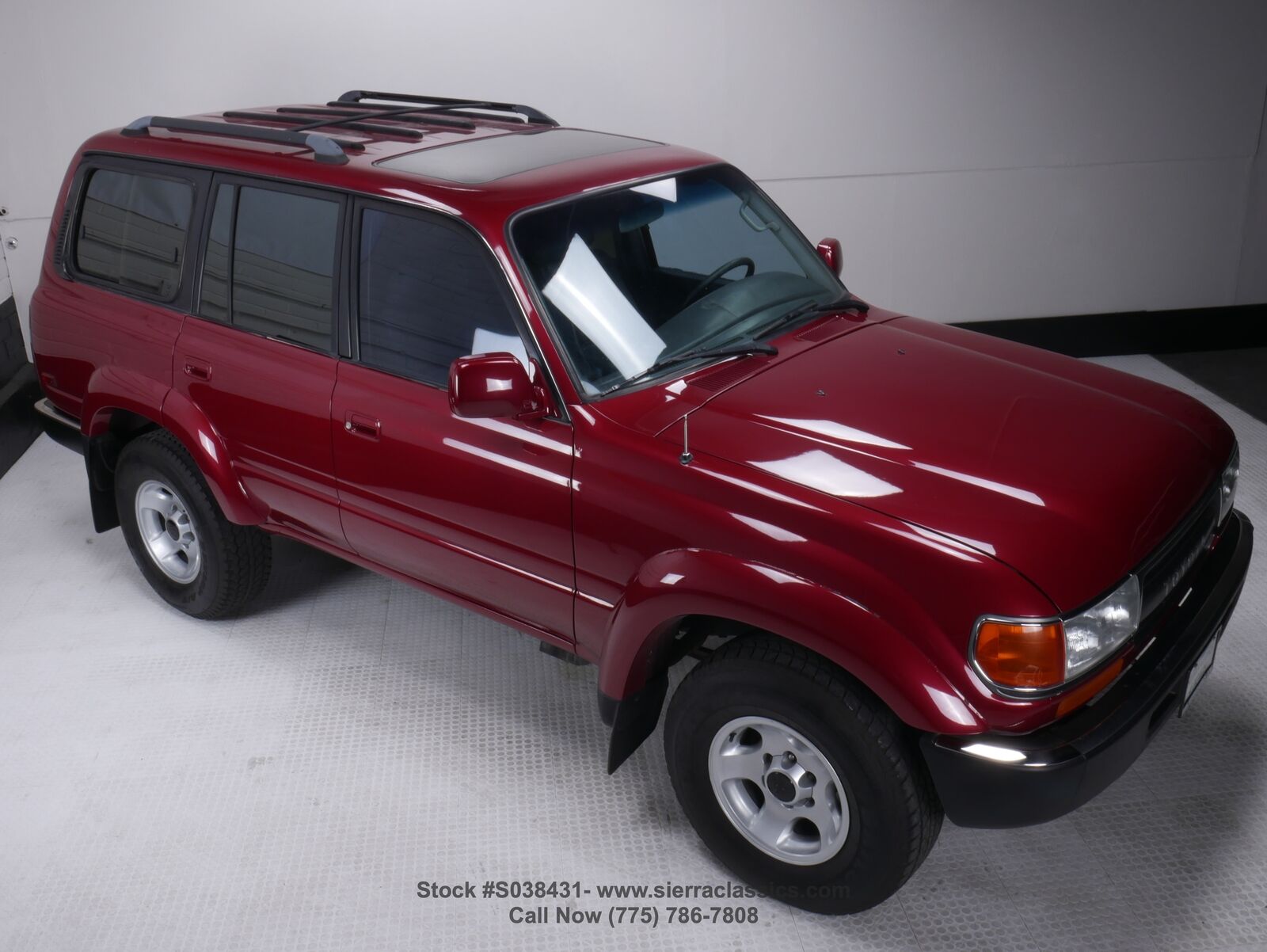-40%
1983 Toyota Land Cruiser HJ60 Turbo-diesel Safari (High Roof)
$ 8448
- Description
- Size Guide
Description
1983 JDM (RHD) Toyota Land Cruiser HJ60 Turbo-diesel Safari167,295.6 KM (103,952.6 Miles) Odometer reading at last fuel fill-up (20 JUN 21)
Model Number N-HJ60-MMZ, 24 volt (two high-duty 12 volt batteries in series)
Frame Number (VIN) HJ60-0010605
H55F-K052 5-speed manual transmission,
2H Engine with turbo kit
Alpine White 033
Additional pics:
https://flic.kr/s/aHsmWeNaPL
Bottom Lines First. The vehicle needs (by order of magnitude):
1. Body work due to rust (estimated 00-00 depending on frame-on or frame-off effort).
2. New 265/70R15 tires (current tires have aged-out, not worn out).
3. AC Evaporator replacement or repair (condenser replaced recently).
4. Fuel gauge float stuck and will require pulling, cleaning, resetting. I use the tripometer to monitor fuel status in the meantime and refill when it passes 600 km (=370 miles).
Notices:
1. This is a 24 volt system vehicle! There are transformers to step-down the voltage to 12 volts for contemporary electronics that have been added since its build in 1983 (the receiver, USB outlet connections, and some 12 volt lights like the front and rear Japanese license plate illuminators). Be mindful that 12 volt light bulbs cannot be used in the original sockets when they're replaced. The lights throughout have been changed to LEDs, so replacements are infrequent now. Step-down transformers powering contemporary electronics (like the receiver again) must provide constant power to retain stored information (like time and programmed radio stations), and that draws power from the batteries constantly. Thus the trickle charger for the batteries for a vehicle that is infrequently started keeps the batteries fully charged; otherwise they'll drain out if the engine doesn't recharge them within a week. Use either the line voltage inlet below the grill to plug in a standard extension cord or set the solar panel between the moon-roof and its internal cover and plug it into the special outlet on the ceiling gauge cluster.
2. This truck is fast now that it's turbocharged but very heavy. It accelerates quickly, and merging onto a highway or passing a slower vehicle quickly are not problems (in fact, it's fun to do when you realize that the other driver sees the antique overtaking his or her new car.) BUT, anti-lock brakes were a rarity in 1983; and this vehicle does not have them. So a larger measure of caution and alertness is required than you may be accustomed to, especially since you'll be sitting on the right and shifting with you left hand (which novelty wears off quickly in a few minutes the first time and you just settle into it as any everyday thing.)
Transfer of title process:
1. If you're personally picking up the vehicle in Orlando, after you inspect and determine to complete the sale, you can pay in cash, initiate a wire transfer, or pay via Escrow.com with an immediate acceptance of the vehicle after inspection such that payment is released before we transfer the title. If you choose wire transfer or Escrow.com, you will have additional fees to cover the payment transfer. After the payment clears, we'll go together to the local motor vehicle service center, 2 miles away, to complete the title transfer. This protects both buyer and seller by validating the transfer and establishing proper ownership with all applicable forms, including, as required by Florida law, "Notice of Sale, form HSMV 82050" (or "Bill of Sale") and the application for a temporary tag for the new owner to operate the vehicle for 30 days. In Florida, the current tag stays with the current owner or must be returned to the state if the insurance on the vehicle is cancelled (which I intend to do once the transfer is complete). So we'll need to acquire a temp tag before you drive away from the service center.
The buyer will be responsible for paying taxes, title, and registration fees at his or her hometown motor vehicle registration office. If the buyer is a resident of Orange County, Florida, that can be done at the same motor vehicle service center that we'll visit for the transfer of title; and no temporary tag will be required.
According to the Florida Highway Safety and Motor Vehicles website (www.flhsmv.gov), a vehicle is considered antique in Florida when it's 30 years old, and it qualifies for reduced initial and renewal registration fees. The reduced fees are applied whether you select the standard blue antique plate or any of the state's other designs, but additional fees may be required for specialty plates. This may be similar in other states, but I'm not familiar with other states' standards.
2. If you're having the vehicle picked up by a third party and shipped to you, you can use a wire transfer or Escrow.com to handle making the payment; you will be responsible to cover the bank or Escrow.com fee for the payment transfer, and you must cover the cost and arrangements for shipping.
We'll handle the completion of the Notice of Sale, required by Florida, via email. I intend to be readily available to your shipper to coordinate the transfer. The inspection period if you use Escrow.com will be set as 2 Days upon your receipt of the vehicle; and if you accept it, then we'll use Escrow.com to transmit the title to you via its collection service at your cost ( per the Escrow.com website). If you reject the vehicle, Escrow.com will return your funds when I receive it back in Orlando, at your cost to ship it back, and less the Escrow.com transaction fee.
History:
This vehicle has had three owners since 1983. It's first owner, in Kobe, Japan, had it for 26 years. It was sold at auction in 2010 to the import agent from whom I bought it in 2011, and I've owned it since then. Each of the three of us treated it well, and the status of its strong engine and clean interior prove it. Even before I renovated the interior, the original carpet and upholstery were clean, just worn. The headliner is still original. It's never been in a collision (though, if it were, it would win that competition and likely demolish the opponent.)
Kobe is coastal, and 26 years in the salty air there have made keeping up with surface rust a constant monitoring task. I had the exterior stripped, primed, and repainted in 2012; and the rust was held at bay until about two years ago. It's time to do it again. This time, I acquired two un-rusted front doors from salvage since those doors seem to be most susceptible; but there are small rust bubbles now under the paint on fenders and back doors.
I always intended to maintain and retain this truly unique HJ60 and have kept a stock of spare parts to do that well; but I own two other antique vehicles and need to make a choice to down-size simply for the amount of resources, in time and dollars, to be dedicated to each of them.
Attributes:
1. Driven «soft» miles only since 2015 – 3 miles to the office and back a few times a month. Before that, we did a few road trips, and I used it more often to get to work. I've never put it through the mud (I know, some of you reading this will think that's a shame).
2. Upholstery and carpets changed in 2012.
3. Built-in trickle charger (an external inlet for line voltage is located below the grill and a solar panel inlet is in the ceiling instrument gauge cluster – solar panel included).
4. All records since 2011, including Microsoft Access database of costs, parts, repairs, mileage and efficiency tracking.
5. Daytime Running Lights.
6. Average 18 MPG through 33,093 km/20,563 miles in nine years one month between 20 MAY 12 and 20 JUN 21.
7. Estimated range between fuelings (full-to-empty): 670-760 KM (420 – 470 miles) = the distance between downtown Orlando and midtown Atlanta with a little bit still in the tank.
8. Running Boards with underboard lighting.
9. Japanese Jiko-Shiki (back-lit) number plates front & rear; rear bracket mounts US standard plate above the Japanese plate with space between so the green glow back lights the US plate.
10. Bluetooth AM/FM Receiver with 6½” flip-up screen; integrated dash-mount USB input.
11. Rearview Camera.
12. Marchal front fog lights with original covers.
13. Rear Step Extended Bumper.
14. Original alloy wheel rims.
15. Manual front locking hubs for 4-wheel drive.
16. Rear Seat Headrests (not standard in 1983 except in JDM Safari models).
17. Uncracked, unblemished dash! (the original owner and I both kept the dash covered with a custom-fitted, removable felt. Not even Florida sunshine and heat has done any harm.)
18. 3M Crystalline series UV protective window tint all around, including CR90 minimal tint version on the windshield. CR90 is a 10% tint, undiscernible from fully clear. CR70 elsewhere for 30% tint on sides and rear.
19. JW Speaker LED Headlights (made in the USA).
Gauges, Instruments, Switches
1. Ceiling Gauge Cluster.
a. Altimeter.
b. Exterior and Interior Temperature (in Celsius).
c. Power Moon-roof.
d. Map Lights.
2. Dash
a. Inclinometer.
b. Front Fog Lights.
c. Rear Fog Lights.
d. Power Fender Mirrors.
e. Power Rear Gate Lock.
f. Exhaust Gas Temp (EGT) meter (reads gas temp at turbine - set to Celsius).
g. EGT high temp warning light (works, but has never hit a warning level for achieving excessively high temps – over 550 C°).
h. Throttle.
i. Rear Heater.
j. Parking lights.
k. Four (4) USB auxiliary power outlets.
l. One (1) NEMA 5-15 (two blades and grounded pin like USA format) 24V auxiliary power outlet (for extension lamp connection).
m. Battery Status Monitor (fully charged to low).
3. Center Console (two stacking compartments type)
a. Heated Front Seats.
b. Rear Wiper (Intermittent (rare) and Continuous).
c. Rear Window Defroster.
d. One (1) front facing and one (1) rear facing 12V automotive auxiliary power socket (cigarette lighter type).
e. Two (2) USB auxiliary power outlets in the rear.
f. Original Japanese electronic toll collection (ETC) card reader (issues alert at engine start-up, in Japanese, that there’s no toll card inserted or, if you put a bank card in, that it’s not a correct card).
4. Steering Column
a. Lights.
b. Front Wiper (Intermittent, Slow, Fast).
5. Rear Cargo Zone
a. RV TV Outlet (disconnected behind the panel - this is for an antenna).
b. One (1) 12V automotive auxiliary power socket (cigarette lighter type).
c. One (1) 24V automotive auxiliary power socket (cigarette lighter type).
d. Interior Lights Switch.
e. One (1) NEMA 5-15 (two blades and grounded pin like USA format) 24V auxiliary power outlet.
f. One (1) NEMA 1-15 (two blades and no grounded pin like USA & Japanese format) 12V auxiliary power outlet.
Some spare parts and consumables are included in the sale; many are new or refurbished / rebuilt stock, except as noted, to be ready for when existing, original parts need replacement. You wouldn't want to be out of commission while waiting for a long-lead or hard to find 30+ year old discontinued replacement part to arrive, and 24 volt replacement parts for RHD vehicles (like wiper motors) aren't readily available at your neighborhood auto supply store. No mechanical, electric, or electronic part lives forever; so keep some spares in the attic or basement.
1. Two (2) un-rusted front doors (from salvage vehicles).
2. Two (2) oil filters, two (2) fuel filters, and two (2) air filter housing gaskets.
3. One (1) each front and rear 24 volt wiper motors + front wiper arms. (RHD wipers swing opposite from LHD and have an opposite hand motor, so you can't use a LHD motor on a RHD vehicle.)
4. Extra new stock seat material and carpet.
5. One (1) 24 volt AC condenser core (not rebuilt, just ready for exchange).
6. Miscellaneous new belts, gaskets, and hoses.
7. Misc. original interior trim parts.
8. Six (6) new glow plugs.
9. Original rear light housings and lenses.
10. One (1) 24 volt alternator.
If you intend to ship the vehicle, check with your shipper to see if they allow the parts listed above to be shipped within the cargo area of the the vehicle. If not, you'll have to make other arrangements to ship the parts.
Pics from the interior renovation in 2012 in which we added acoustical lining:
https://flic.kr/s/aHsmWfehea
